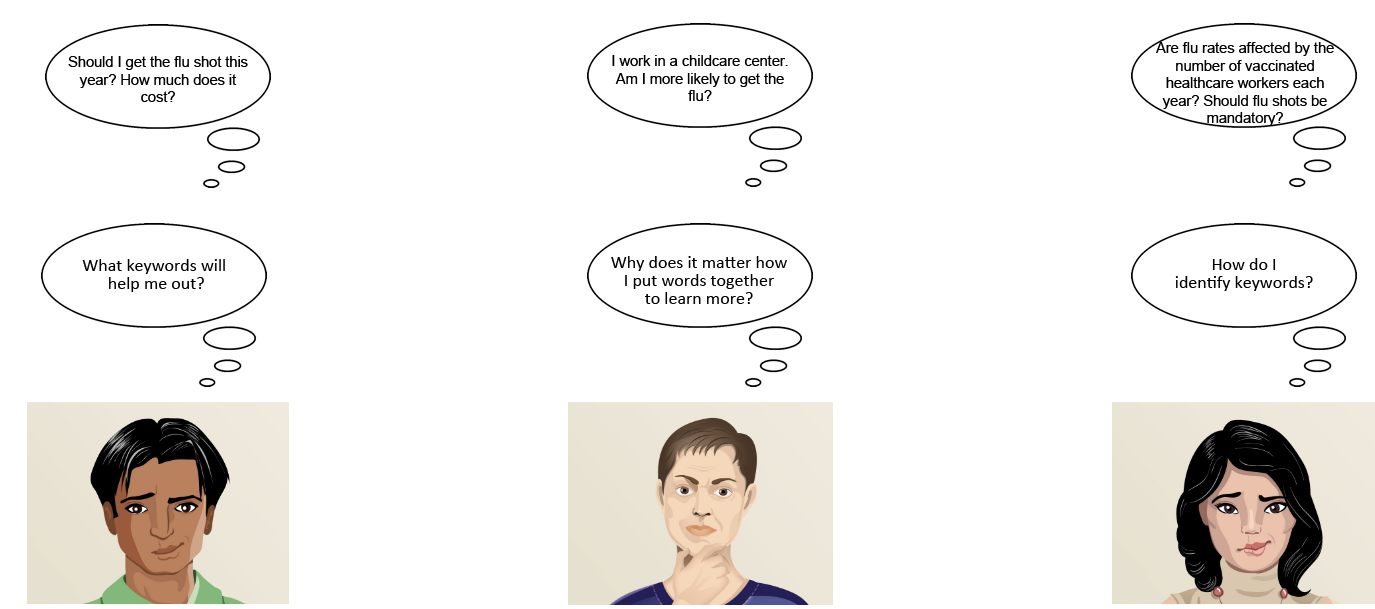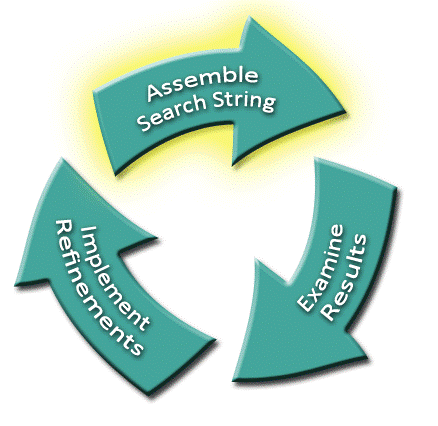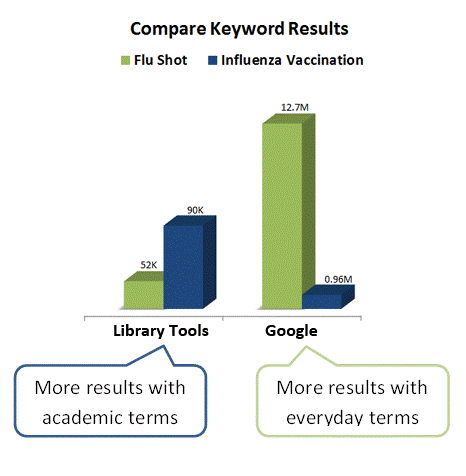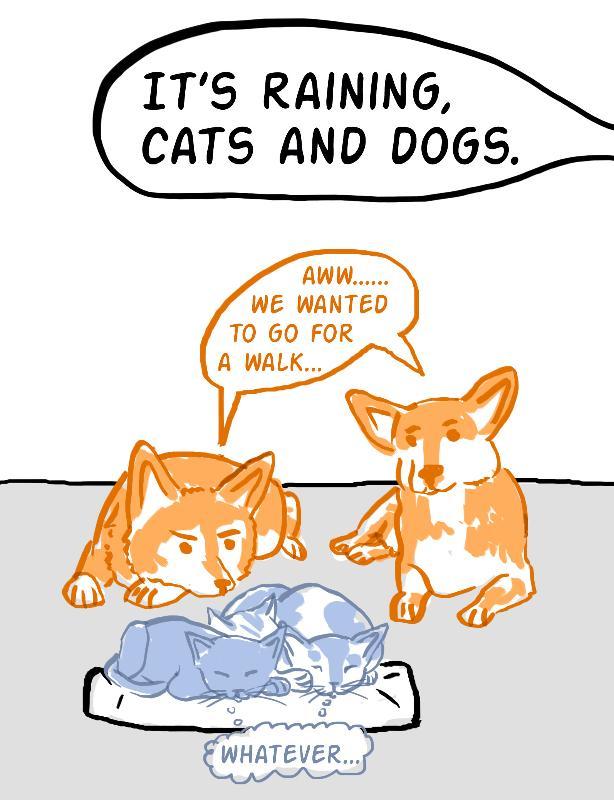Searching Strategically
Searching Strategically
You'd like to gather information on a topic. You've created a research question. You've identified the likely information types you need and which search tools to use. Now it's time to search.



In order to get a search tool to give you information that serves your specific need, you must feed it the right words: keywords. A keyword describes an essential characteristic of the document or page you want to find. Stringing several keywords together results in a search string, or query.
Got plans?
Have you ever started searching for information, only to get overwhelmed and settle for the first few results you get?
Without a strategy, it's easy to get buried by the huge amount of information available digitally.

Searching is an iterative cycle
Iteration (n) a procedure in which repetition of a sequence of operations yields results successively closer to a desired result, Merriam-Webster Dictionary.
Research is an iterative cycle, meaning you may need to repeat your search several times. You will need to revisit your strategy each time in order to obtain the information you need. On the first search, you may not know all the right words to use or all the right places to look. It is common to feel uncertain and that's okay.
In this lesson you will learn about all three parts of the search cycle .
The Search Cycle

Assemble a Search String
Search tools like databases and even Google are not smart. They are primarily matching your keywords to words that appear in the sources. The more words search tools can match, the higher they rank the source. Therefore, you have to tell them exactly what you want them to find. For example, if you enter the word child into a search tool, it will only search for items containing the word child, and omit sources about children .
When designing your search string, start with these three steps:
1. Create a list of keywords
2. Combine keywords and concepts
3. Use punctuation tricks
1. Keywords:
A keyword describes an important aspect of your investigation. Keywords are bolded in the research question below:
"Should flu shots be mandatory for healthcare workers ?"
The more keywords you can think of, the more likely it will be that you will find what you are looking for because every search tool uses a different set of keywords to describe items in their index or database. One search tool might use the keyword phrase "flu shot" and another might use "influenza vaccine." Develop a list of several keywords for each main idea in your research question. (Useful Video)
Which words? It does matter.
Keywords and phrases are weighted differently in different search tools. For example, the phrase flu shot results in many more items than influenza vaccination in Google, but in a library search tool, the opposite occurs.

2. Combine Keywords and Concepts:
When you enter words into a search tool, such as flu shots mandatory doctors nurses, you are telling the search tool to search for items that contain ALL of those keywords.
The search tools use an implied AND to combine all terms: flu AND shots AND mandatory AND doctors AND nurses. That means it will return everything with all of your keywords, even if an article or source has nothing to do with doctors and nurses getting flu shots.
Narrow your search
AND is an example of a Boolean Operator, words you can use to connect your keywords systematically. As you add more keywords, the number of documents that contain all of the keywords is going to diminish.
Expand your search
OR is a Boolean Operator that expands your search. You don't necessarily want both of the keywords doctors and nurses to be in each of the items in your results list. Combine the doctor and nurse keywords with the OR operator to tell the search tool that either keyword is acceptable. Terms combined with OR should be set off with parentheses.
Example: flu shots AND mandatory AND (doctors OR nurses)
3. Use Punctuation Tricks


Punctuation is important for communication.
It's raining cats and dogs!
It's raining, cats and dogs!
It's important when you research, too.
There are several punctuation tricks you can employ in your search strategy. In addition to parentheses, which you just learned about on the last page, quotation marks and the asterisk symbol are also great to know.
Putting quotation marks around words tells the search tool to search for those words as a phrase. For instance, when you enter "flu shot", instead of searching for everything flu and everything shot , you are searching for the phrase flu shot .
Searching a phrase is more precise than searching keywords individually and finds fewer results:
Library Search Tool
"Flu Shot" with quotation marks
5,140,000 results
8,539 results
Flu Shot without quotation marks
12,700,000 results
51,787 results
"Influenza Vaccination" with quotation marks
498,000 results
18,040 results
Influenza Vaccination without quotation marks
959,000 results
89,993 results

Use the asterisk symbol to truncate your keywords. This means searching for all variant endings of a word. For example, truncating the word vaccinate to vacci* will tell the search tool to search for
Vaccinate
Vaccinates
Vaccine
Vaccines
Vaccination
Vaccinations
Vaccinating
Examine Results
Once you have created a search string for your topic, try it out in the search tool you have identified and examine your results.
- Did you get what you expected?
- Too many results? Too few?
- Not the right information?
Designing a good search string can be extremely helpful but even the best designs can fail depending on the topic, search tool, and keywords used. At this point determine where your strategy succeeded or failed and refine your search string by one (or more) of these strategies:
- Try different keywords from your list or new words that you saw in your results
- Eliminate keywords to broaden your search
- Add keywords to narrow your search
- Use the built-in limiting features available in most search tools.
Implement Refinements
In addition to the above refinements, most search tools will also allow you to limit your results by:
- Date
- Language
- Resource type (book, article, film, etc.)
- Intended audience (scholarly, trade, popular)
- Human or animal (for medical research)
- Subject headings (specific tags assigned to items within a given search tool)
Try a combination of search strategy revisions and database limiting to arrive at a better set of results.

"Search Strategies Design, Refine, Adjust" by New Literacies Alliance is licensed under CC BY-NC-SA 4.0 / A derivative from the original work